Adam Guthrie is a professional chef. He created the I Feel Good program to promote whole food plant-based eating. Health issues at the age of 39 prompted his own plant-based diet.
Adam reversed his health problems and now helps people achieve similar results. Tune in as he talks about his business and its evolution from offline demos to largely online membership.
Podcast: Download (Duration: 40:33 — 37.4MB)
Get Notified Of Future Episodes Apple Podcasts | Spotify | Amazon Music | Android | Blubrry | Gaana | TuneIn | Deezer | Anghami | RSS | More
In the episode:
Let James help you break into the online market for your business
Our guest Adam Guthrie trained as a chef, and now owns a paid membership built around whole food plant based recipes. His business has its roots in something that happened to him about 12 years ago.
The event that changed one surfer’s life
At age 39, Adam weighed 110 kilos. One day in the surf, a 10 to 12-foot swell came right for him. He paddled hard, just managing to escape. As he punched through the lip, a pain shot across his chest and down his left arm.
Adam made it home, thinking he should probably get checked. Right after he got some paperwork done. Sitting down, he felt a crushing pain in his chest, with nausea and cold sweat. His mother-in-law drove him to the hospital, where they told him he’d had a heart attack. They put him on meds, which they said he’d need for the rest of his life.
A month later, Adam’s cardiologist asked how he felt. Flat, said Adam. He’d lost his mojo, had no enthusiasm. It was the meds, said the doctor. Then let’s wean me off them, said Adam. No, he was told. He was on them for life. If things didn’t change in another month, the doc would give him another med for a lift.
Adam went home and googled how to reverse heart disease with food. What came up was a whole food plant based diet – a vegan diet, but whole, not processed, foods. Adam adopted it, and within six months was off all meds.
“Life is pretty precious.”
Twelve years later, he’s still off them. His bloodwork every year is ideal for someone who’s had an attack. He still makes and eats plant based diet recipes, weighs 75 kilos, and has heaps of energy. And what he really learned, he says, is that life is pretty precious.
Jobs that will slowly kill you
Like James, says Adam, he was in the wrong industry. He’d built a real estate business that was doing very well, and he’d enjoyed the journey. But at the time of his attack, he had no control over his time or his life. He had to respond all the time, and was pretty unhappy.
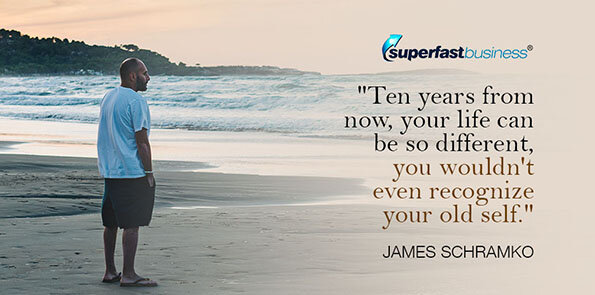 For listeners in the same place in their lives, James has a message: 10 years from now, your life can be so different, you wouldn’t even recognize your old self. It certainly was true for Adam.
For listeners in the same place in their lives, James has a message: 10 years from now, your life can be so different, you wouldn’t even recognize your old self. It certainly was true for Adam.
An app-funded lifestyle
In 2010, Adam created a cookbook app, to keep himself on track with a plant based meal plan every week. He thought others might like it, too, and made it available online. It was on 500,000 phones, making enough money for Adam to leave real estate. With the app earnings, he and his family moved to Bali, where they lived for three years before returning to Australia.
John Lint, before he created 10XPRO, handled the tech behind Adam’s app, and did an amazing job. He sold his company, however, and the people who took over, in Adam’s words, “just trashed it”. Revenue from the app just disappeared.
From plant based recipes to diet program
Adam switched from the app to creating a diet program. He used ClickFunnels for a while, which was okay, he says, but clunky. Then out of the blue John emailed him. They had a chat, and Adam jumped across to 10XPRO. The best decision he made, says Adam.
They run their whole platform through 10XPRO. The funnels work well to get people into the course, and once they’re in, the structure and navigation are great. Building the pages is easy, and the payment gateways linking integration is amazing.
Suggest a feature, and shortly after, it’s been added to the program. 10XPRO have the best support as well, instant response to any question you have. Adam and his team have actually taken that and brought it to what they do, improving both conversion and retention.
James has seen Adam’s business double every year for the last few years. His mission to help people is proving a reward not just personally but financially.
What feeling good looks like
James invites Adam to share his perspective, as well as the customer’s on ifeelgood.com.au.
Adam says he created the business due to lack of choice. When he had a heart attack, he was not asked to choose between medication and a change of lifestyle. Both are evidence-based, and both proven to reverse or reduce the symptoms of a wide range of diseases. It annoyed Adam that he wasn’t given that choice.
Granted, a lot of doctors aren’t aware of the whole food plant based diet. Adam tells of the doctor who helped him train for an Ironman triathlon. In 30 years of practice, this doctor said, he had never seen those sorts of results with food. After training Adam, he shifted his practice to one that was lifestyle-based and plant based predominant in regards to treatment.
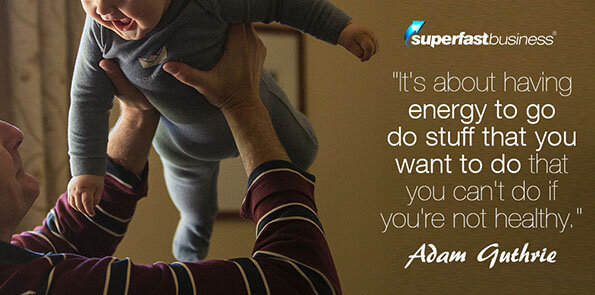 Adam clarifies that he is not anti-medication. There are meds that can save your life. The trouble is, many of them make you feel dead. And if you can choose between that and a diet that will heal you and make you feel amazing, why shouldn’t you have that choice? Says Adam, It’s about having energy to go do stuff that you want to do that you can’t do if you’re not healthy.
Adam clarifies that he is not anti-medication. There are meds that can save your life. The trouble is, many of them make you feel dead. And if you can choose between that and a diet that will heal you and make you feel amazing, why shouldn’t you have that choice? Says Adam, It’s about having energy to go do stuff that you want to do that you can’t do if you’re not healthy.
“You either pay for the good food up front or you pay for the medical bills later.”
James has heard much of the same “food as medicine” from someone with a rheumatoid arthritis membership. They were very sick, on a lot of drugs, overweight, just at the end of their tether. And with diet they came back, vital and vibrant and positive. You either pay for the good food up front or you pay for the medical bills later is a quote that James has heard.
Leading other people to the choice
Adam’s program is membership-based, an annual subscription. He was lucky when he first started to have a bit of a list, from his app and from doing in-person cooking classes and demos and talks. He emailed that list when the program began, and got their first few customers.
The program used to last a month, and in those four weeks they saw amazing results. Blood pressures and cholesterol dropped; all the numbers changed for the better. People felt good.
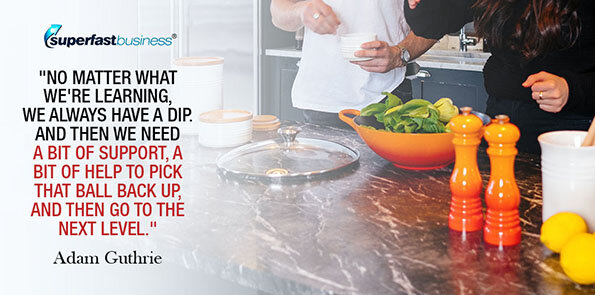 After four weeks, however, people would revert to their old eating habits. And that, says Adam, is actually part of the learning process. No matter what we’re learning, we always have a dip. And then we need a bit of support, a bit of help to pick that ball back up, and then go to the next level.
After four weeks, however, people would revert to their old eating habits. And that, says Adam, is actually part of the learning process. No matter what we’re learning, we always have a dip. And then we need a bit of support, a bit of help to pick that ball back up, and then go to the next level.
So Adam made the program 12 months, long enough to accommodate the dips until the program became a sustainable habit change.
The membership is made up of the following:
The community, says Adam, is super active, super engaged. They’ve seen reversals of type two diabetes, heart disease, arthritis, autoimmune diseases, IBS, diverticulitis, you name it. And people have maintained reversals for up to three years.
 It’s empowering, too, Adam says, to be able to do work that is not only good for you income-wise, but also is good for everybody else that incorporates it. There’s nothing better than being able to share your passion and being paid for it.
It’s empowering, too, Adam says, to be able to do work that is not only good for you income-wise, but also is good for everybody else that incorporates it. There’s nothing better than being able to share your passion and being paid for it.
How many of their converts stay with them after the first year? About 50 percent, and they’ve now had people stay for three years.
The evolution of Adam’s marketing model
After getting his first customers through his list, the source sort of dried up for Adam. That’s when he happened to watch the documentary In Excess. INXS’s business model was to do gigs every night for several years. This meant, one, they became a household name overnight, and two, they mastered their craft by practicing every day.
Adam hopped on the road, booking venues for every second night around Australia. He’d do a three-hour talk and cooking class, and half the people who were at the classes would join his program. Revenue was good. He did that for about 18 months, and loved it. Then COVID hit. They lost 92 percent of their revenue overnight.
“Bad habits are bred in good times.”
That was a wake-up call. Adam realized he’d been cruising, and had to look at other options. He decided to market online, and looked heavily into Facebook ads. He learned what he could, ran a few tests, and on the first tries was getting $200 for every $20 put in. The guys helping him were blown away. He had an offer that converted, and he knew exactly where his target audience was.
Adam manages it all himself now, and it still runs well. In some tests they get $100 out for $100 in, but the ones that convert still sit $10 to $30, getting $200 back.
The typical workload we’re talking about
When your membership is generating hundreds of thousands of dollars in revenue, what does a normal workday look like?
Adam’s main focus is on lead generation. Running the program, with people in it, doesn’t take a lot of time. On a typical day, he’ll wake up, meditate, go for a surf. Then he’ll go to a cafe, and there, support people in their Facebook community – thumbs up, likes and stuff; have a chat with them.
Around 10:30, he has a meeting with his team (this he thanks James for – he helped him learn to manage a team). There’s three of them – a graphic designer, customer support, and Adam who delivers the product and does the marketing. After the meeting, each goes off and does their thing.
Other things Adam might do is head to the market for fresh produce and collab with friends on their farm.
How sustainable is it? They can go on that way, thinks Adam, until they double again. There’s so much space in a day.
When your audience spans the globe
Most of Adam’s market is Australian, but they have customers in the US, Canada, South America, the UK, all through Europe, India, everywhere.
Adam’s site is ifeelgood.com.au, and he sells in Australian dollars. He tried to buy the .com, back in dial-up days, he says, but was thwarted by his connection. He put it off for the night and the following day it was gone. Ironically, a pharmaceutical company now owns it. They don’t use it, he wants it, and they won’t sell it to him.
Some final thoughts to chew on
Dam offers some closing advice to anyone with a lifestyle or autoimmune disease: what’s really important is to understand that there is a choice, and that you can adopt a whole food plant based diet.
He does want to make clear, if you are on medications, never take yourself off medications without your doctor’s advice. The best way to get off meds is to be monitored by your doctor while you eat a whole food plant based diet meal plan. What will happen is, the medications will lower your blood numbers, and so will the food.
You need to be monitored, because it can be dangerous if the numbers drop really fast. And once they start the drop, your doctor has to adjust your meds, because it will be dangerous to keep you on them.
If you want guidance, Adam can definitely help you. He’s got a free course on the website you can start with, teaches all about plant based meals. And if you find yourself with a lifestyle disease or want to prevent a lifestyle disease, remember, don’t leave it too late.
Interested in Adam’s program? Find out more at ifeelgood.com.au.
Achieve what’s possible online for your business with JamesSchramko membership.
Liked the show? Leave us a review on iTunes

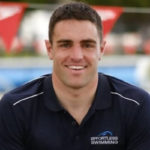
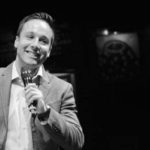
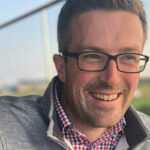





Leave a Reply